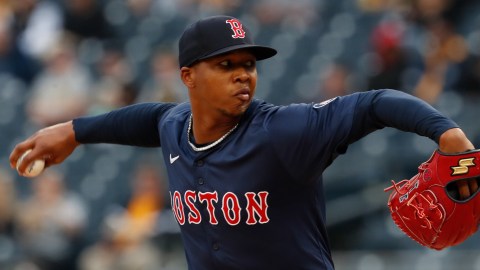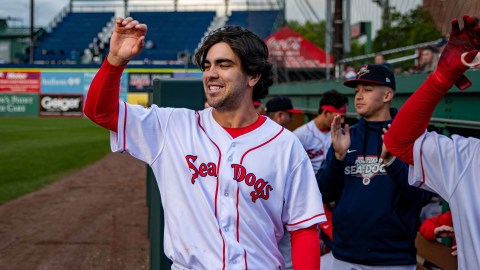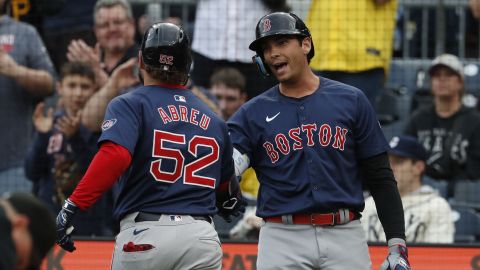Martha Coakley has the president endorsing her in this week’s special election for the U.S. Senate. Scott Brown has Curt Schilling. You tell me who’s better off.
There’s no doubt about it: Massachusetts voters love their sports. The Red Sox, Patriots, Bruins, Celtics — you name it. Sometimes, you have to wonder whether the heroes on the ballfield matter more to this state than the politicians.
According to political reporter Andy Hiller of 7NEWS on WHDH, this has been an issue before.
“In 1975, there was a mayor’s race,” Hiller said. “Kevin White was running against this guy named Joe Timilty in this great mayor’s race — but neither one of them could get any attention, because all anybody cared about was the Red Sox.”
White served four terms as mayor of Boston, taking office in 1968 and serving the city until 1984. Carlton Fisk hit a game-winning home run in Game 6 of the ’75 World Series, propelling the Red Sox to victory at Fenway Park. Ask the average Joe on the street who they remember better, and the answer might not surprise you.
Thirty-five years later, we’re looking at a Senate race between two candidates with seriously contrasting takes on the world of sports. Brown, the three-term state senator and Republican nominee to replace the late Ted Kennedy, is immersed in it. He was a star athlete growing up, serving as basketball captain at both Wakefield High School and Tufts University. He’s got a daughter playing hoops at Boston College as we speak, and he’s earned the endorsements of prominent sports figures in Massachusetts like Curt Schilling and Doug Flutie.
Coakley, the state’s attorney general and the Democrat up for the seat, has had very little to do with the sporting world. And she doesn’t seem too impressed with her opponent’s involvement.
Coakley drew the ire of conservative pundits this week when she took a jab at Brown for campaigning at Fenway. And she made the political gaffe of the century Friday night when she referred to Schilling, the ace of a World Series winner in Boston, as “another Yankee fan.”
No one ever said that this election was about sports. Certainly, health care and education are more important this election season than curveballs and ground-rule doubles. But right about now, it’s starting to look like the “issue” of athletics could make a difference.
“Sports has played a tangential and interesting role,” Hiller said, “in that all it has really served to do is embarrass one candidate. Martha Coakley’s lack of knowledge about Curt Schilling, and also — I don’t really think she dissed Fenway Park, but her lack of instant and permanent love for it — reinforced the notion that she was not ‘one of the gang.’ And if she loses, that will be one of the reasons that will be cited — her inability to identify with the common voter.”
But it’s not just about wooing the big stars like Schilling. Being a sports fan means being up on the headlines day after day, sticking with the teams through good times and bad. And Brown has been a steady presence on the Boston sporting scene.
“I think what’s really important is the sports connection that Brown has milked,” said Jon Keller, political analyst for WBZ-TV News. “Not so much being endorsed by athletes, like Schilling and Flutie — not that those are negatives, they do win votes — but more importantly that he’s been a presence on sports talk radio. That’s a great way to reach men, and more than a few women, too. And she [Coakley] has been invisible.”
Coakley has shied away from sports this whole election season. She hasn’t talked about her personal history with sports, about her fandom, about her rooting interests. It’s not on her radar. To Schilling, that represents “elitism and arrogance” — to Coakley, it just isn’t relevant. She’s focused on politics.
“No matter what the truth,” Hiller said, “the takeaway is that Martha Coakley has no interest in sports — even though she may.”
Meanwhile, Brown is using sports as a way to drum up support among common voters. And it’s working, too — he’s been gaining ground in polls all over the state. He’s been all over the airwaves, letting the fans hear his message.
Perhaps too much?
“I think that where both candidates have turned voters off, though, is with all the ads they’ve placed during games,” Keller said. “You’re just trying to watch the Celtics, or some football, and you have to put up with all this mudslinging. It’s a bit much.”
Getting involved in the sporting world can have its perks and its drawbacks. Do it enough, you win a couple votes. Do it too much, you risk coming off too aggressive, or worse, too preachy. There’s a fine line. And in the end, there’s no guarantee that it’ll have that big an impact.
“I don’t think it really matters. Not in these times,” said Keller, citing health care, taxes and terrorism as bigger issues.
And yet, the sporting news continues to top the headlines. An endorsement here, a campaign stop there, and our sports heroes just keep on making news. Even in election season.
“Sometimes, the relationship between sports and politics,” Hiller said, “even though they say these are America’s two great pastimes, is that when sports really get passionate, it can displace politics.”
You could say that again.
Election Day is hours away. And for that one day, Coakley and Brown will soak up all the attention.
But if a Curt Schilling type happens to sneak into the spotlight along with them, don’t be too surprised. In Massachusetts, that’s par for the course.



